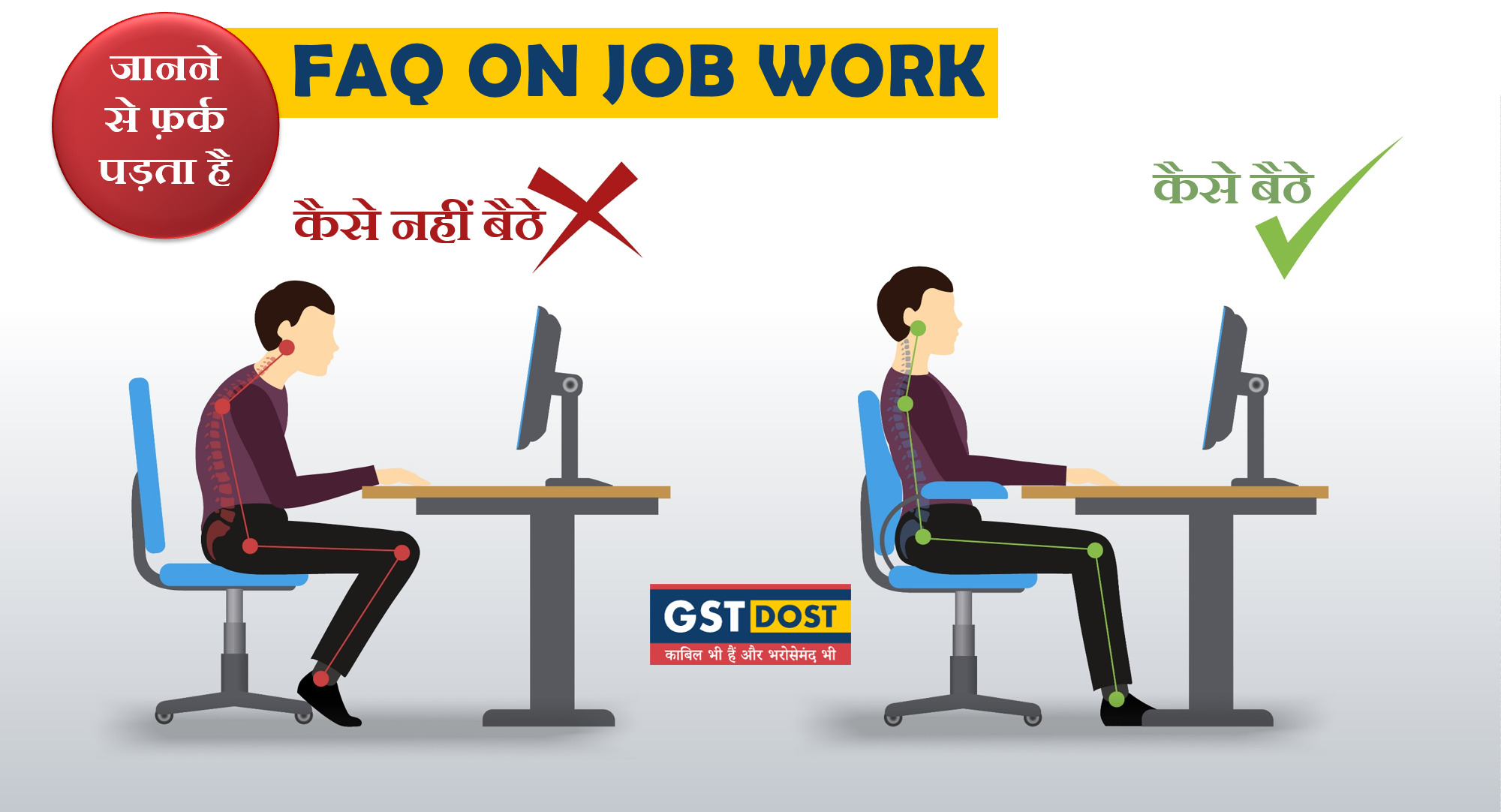YOU ARE HERE Home > Blogs > FAQ on Job Work
FAQ on Job Work
GST DOST's BLOG

| Resource | Chapter 32 |
| Resource | GST Discussion |
Q1. What is the definition of ‘Job work’ and ‘Job worker’ under GST?
As per section 2(68) of the CGST Act, 2017, “Job work” means any treatment or process undertaken by a person on goods belonging to another registered person and the expression “ job worker” shall be construed accordingly.
Q2. Who is a ‘Principal ‘under GST?
As per section 2(88) of the CGST Act, 2017, “Principal“ means a person on whose behalf an agent carries on the business of supply or receipt of goods or services or both.
Q3. What is the meant by ‘Inputs’?
As per section 2(59) of the CGST Act, 2017, “Input” means any goods other than capital goods used or intended to be used by a supplier in the course or furtherance of business.
Q.4 What is meant by ‘Capital Goods’ ?
As per section 2(19) of the CGST Act 2017, "Capital Goods" means any goods, the value of which is capitalised in the books of account of the person claiming the input tax credit and which are used or intended to be used in the course or furtherance of business .
Q5. Does the expression ‘Capital Goods’ include ‘Plant & Machinery ‘?
As per Explanation to Rule 45(4) of the CGST Rules, 2017, the expression 'Capital Goods’ shall include "plant and machinery" as defined in the explanation to section 17which means apparatus, equipment, and machinery fixed to earth by foundation or structural support that are used for making outward supply of goods or services or both and includes such foundation and structural support but excludes:
(i) Land, building or any other civil structures;
(ii) Telecommunication towers; and
(iii) Pipelines laid outside the factory premises.
Q6. Are there any separate provisions relating to job work when the principal and the job worker are located in two different States/ UT.
As per section 20 (xxii) of the IGST Act, 2017, Provisions relating to job work under the CGST Act are also applicable to the transactions between principal and job worker , when they are not located in the same State /U.T.
Q7. Can the supplier of the principal directly send the goods to the premises of the job worker instead of sending such goods to the premises of the principal?
As per section 19(3) of the CGST Act, 2017, the Principal shall be entitled to take credit of input tax on inputs even if the inputs are directly sent to a job worker for job work without being first brought to his place of business. Further as per section 19(5) of the Act, even capital goods can also be directly sent to the premises of the job worker.
Q8. Can at the instance of the principal, inputs / capital goods be sent from one job-worker to another job-worker?
As per section 143(1) of the CGST Act, 2017, A registered person send any inputs or capital goods, without payment of tax, to a job worker for job work and from there subsequently send to another job worker.
Q9. What is the procedure of transportation of goods to a job worker?
As per Rule 55 of the CGST Rules, 2017, the consigner may issue a delivery challan, serially numbered not exceeding 16 characters, in one or multiple series, in lieu of invoice at the time of removal of goods for transportation, containing the following details, namely:-
(i) date and number of the delivery challan;
(ii) name, address and GST Identification Number of the consigner, if registered;
(iii) name, address and GST Identification Number or Unique Identity Number of the consignee, if registered;
(iv) HSN code and description of goods;
(v) Quantity (provisional, where the exact quantity being supplied is not known);
(vi) Taxable value;
(vii) Tax rate and tax amount – central tax, State tax, integrated tax, Union territory tax or cess, where the transportation is for supply to the consignee;
(viii) Place of supply, in case of inter-State movement; and
(ix) Signature.
(2) The delivery challan shall be prepared in triplicate, in case of supply of goods, in the following manner, namely:–
(a) the original copy being marked as ORIGINAL FOR CONSIGNEE;
(b) the duplicate copy being marked as DUPLICATE FOR TRANSPORTER; and
(c) the triplicate copy being marked as TRIPLICATE FOR CONSIGNER.
(3) Where goods are being transported on a delivery challan in lieu of invoice, the same shall be declared as specified in rule 138 (E-Way Bill Rule).
Q. 10 Is it necessary to prepare a delivery challan even under circumstances where inputs / capital goods were directly sent from the supplier to the premises of the job worker?
Yes, the Rule 45 (1) of the CGST Rules, 2017 confirm the same.
Quote
The inputs, semi-finished goods or capital goods shall be sent to the job worker under the cover of a challan issued by the principal, including where such goods are sent directly to a job-worker.
Un-quote
Q11. What are the provisions of e-way bill with regard to job work?
As per Rule 138(1) of the CGST Rules, Every registered person who causes movement of goods of consignment value exceeding Rs 50,000/—
(i) In relation to a supply; or
(ii) For reasons other than supply; or
(iii) Due to inward supply from an unregistered person, shall, before commencement of such movement, furnish information relating to the said goods in Part A of FORM GST EWB-01, electronically, on the common portal.
Para A.7 of GST EWB-01 under Reason for Transportation at Code 3 has clearly mentioned job work as one of the reasons for using of FORM GST EWB-01.
Provided that where goods are sent by a principal located in one State to a job-worker located in any other State, the e-way bill shall be generated by the principal irrespective of the value of the consignment.
Q12. What is the time limit within which inputs as such or after processing & capital goods should be received back by the principal?
As per section 143(1)(a) of the CGST Act, Inputs as such or after processing should be received back by the principal either at the place of business from where such inputs were sent or it can be sent to any of his other registered place of business within 1-year of their being sent out. In the case of capital goods , the time limit is 3-years . However, However, time limit is not applicable in the case of moulds and dies, jigs and fixtures, or tools.
Q.13 What is the basis of computation of the period of 1-year in the case inputs and 3-years in the case of capital goods when they are directly sent by the supplier to the premises of the job-worker?
As per proviso to section 19(3) of the CGST Act,2017, where the inputs are sent directly to a job worker, the period of 1-year shall be counted from the date of receipt of inputs by the job worker.
Q14. Is it possible for the principal to effect supply of goods from the premises of the job worker?
As per section 143 (1)(b) of the CGST Act, 2017, Direct supply of inputs as such or after further processing or capital goods (other than moulds and dies, jigs and fixtures, or tools) on payment of tax within India, or with or without payment of tax for export, as the case may be from the premises of the job work can take place only when such place has been declared as the additional place of business in the RC granted to the principal.
Under following circumstances, it is not necessary for the principal to include the premises of the job worker as the additional place of business of the principal :
(i) the job worker is a registered job worker under section 25 of the CGST Act,2017
(ii) the principal is engaged in the supply of notified goods.
Q15. What are the consequences where the inputs or capital goods are not returned to the principal within the time specified (1-Year/ 3-Years ) in section 143 of the Act ?
As per section 143(3) read with Rule 45(4) of the CGST Act / Rules, 2017 , where the inputs or capital goods are not returned to the principal within 1- year and 3-years respectively, it shall be deemed that such inputs or capital goods had been supplied by the principal to the job-worker on the day when the said inputs or capital goods were sent out and the said supply shall be declared in FORM GSTR-1 and the principal shall be liable to pay the tax along with applicable interest .
Q16. Is the principal required to submit any returns in relation to the job-work transactions with the Govt.?
As per rule 45(3) of the CGST Rules, 2017, the principal is required to submit a quarterly return in FORM GST ITC-04 within 25 days from the close of the quarter. In such return details of challans in respect of goods despatched to a job–worker or received from a job-worker or sent from one job-worker to another during a quarter are required to be included.
Q17. What are the GST rates on job –work ?
GST rates with respect to job-work are tabulated below :
|
(i) Services by way of job work in relation to- |
3 |
|
(a) Printing of newspapers; |
|
|
(b) Textiles and textile products falling under Chapter 50 to 63 in the First Schedule to the Customs Tariff Act, 1975 (51of 1975); |
|
|
(c) all products falling under Chapter 71 in the First Schedule to the Customs Tariff Act, 1975 (51of 1975); |
|
|
(d) Printing of books (including Braille books), journals and periodicals; |
|
|
(da) printing of all goods falling under Chapter 48 or 49, which attract CGST @ 2.5per cent. or Nil;] |
|
|
(e) Processing of hides, skins and leather falling under Chapter 41 in the First Schedule to the Customs Tariff Act, 1975 (51of 1975); |
|
|
(f) all food and food products falling under Chapters 1 to 22 in the First Schedule to the Customs Tariff Act, 1975 (51of 1975); |
|
|
(g) all products falling under Chapter 23 in the First Schedule to the Customs Tariff Act, 1975 (51of 1975), except dog and cat food put up for retail sale falling under tariff item 23091000 of the said Chapter; |
|
|
(h) manufacture of clay bricks falling under tariff item 69010010 in the First Schedule to the Customs Tariff Act, 1975 (51of 1975);] |
|
|
(i) manufacture of handicraft goods. |
|
|
(ia) Services by way of job work in relation to- |
6 |
|
(a) manufacture of umbrella; |
|
|
(b) printing of all goods falling under Chapter 48 or 49, which attract CGST @ 6per cent. |
|
|
(ii) Services by way of any treatment or process on goods belonging to another person, in relation to- |
3 |
|
(a) printing of newspapers; |
|
|
(b) printing of books (including Braille books), journals and periodicals. |
|
|
(c) printing of all goods falling under Chapter 48 or 49, which attract CGST @ 2.5 per cent. or Nil.] |
|
|
(iia) Services by way of any treatment or process on goods belonging to another person, in relation to printing of all goods falling under Chapter 48 or 49, which attract CGST @ 6per cent. |
6 |
|
(iii) Manufacturing services on physical inputs (goods) owned by others, other than (i) (ia), (ii) and (iia)] above. |
9 |
Q18. Who is responsible for keeping proper accounts for the inputs or capital goods, whether it is the principal or the job-worker?
As per section 143(2) of the CGST Act, 2017, the responsibility for keeping proper accounts for the inputs or capital goods shall lie with the principal .
Q19. What are the transitional provisions relating to job work?
As per section 141(1) of the CGST Act, 2017, where 6-months prior to the introduction GST, if any inputs as such or semi-finished goods were sent to the job-worker for further processing, testing, repair , reconditioning or any other purpose in accordance with the provisions of the existing laws ( Excise, Service Tax, VAT) and such goods as such or after further processing are returned within six months after the introduction of GST , there will not be any levy of tax under GST. However, in case goods are not received back within the specified period , input tax credit , will be recovered from the principal and no input tax credit is allowed on such recovered amount .
Q20. Is there any requirement of furnishing FORM GST-TRAN-1 in relation to job-work?
As per Rule 119 of the CGST Rules, 2017, every person to whom the provisions of section 141apply shall, within ninety days of the appointed day, submit a declaration electronically in FORM GST TRAN-1, (Table 9) specifying therein, the stock of the inputs, semi-finished goods or finished goods, as applicable, held by him on the appointed day.

Allahabad High Court Provides Relief to Businesses in Landmark GST e-Way Bill Ruling. [News]
GST Amnesty Scheme: A Golden Opportunity, But Heed the Advisory - Tax Samachar [News]
Madras High Court Quashes ITC Claim Rejection Based Solely on GSTR-3B and Directs Authorities to Consider Other Returns like GSTR 2A and GSTR 9. [Blog]
Supreme Court Upholds Statutory Immunity for Officers Under GST Act: A Closer Look at the Landmark Decision [Blog]
Consultant के Foreign Client पर GST का Impact [Video]
Goods Transport Agency और Multimodel Transporter अलग अलग है [Video]


